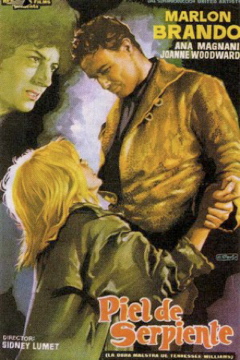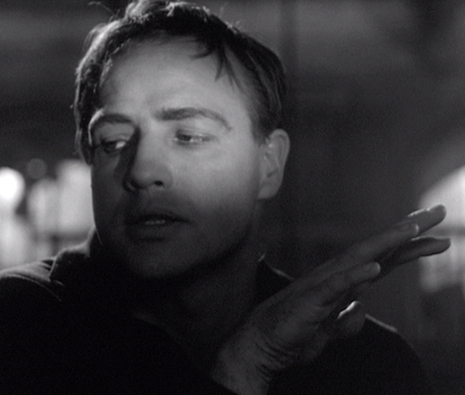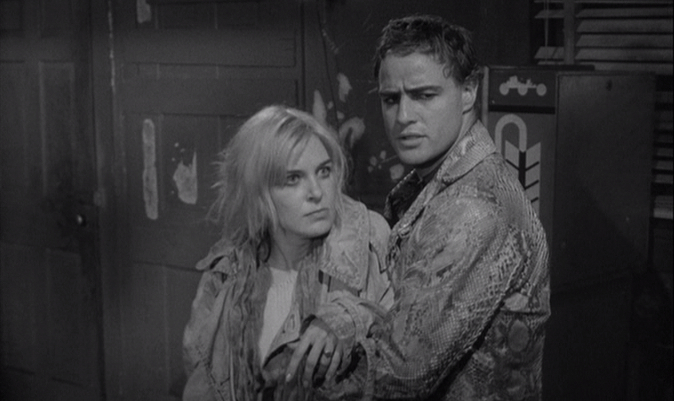 Michael C. here from Serious Film to join in the Tennessee Williams festivities. When I picked a film to write about I jumped at The Fugitive Kind because
Michael C. here from Serious Film to join in the Tennessee Williams festivities. When I picked a film to write about I jumped at The Fugitive Kind because
A) I'm a big Sidney Lumet fan and
B) I was curious how a second Brando/Williams collaboration could fly so far below my radar. I got my answer and then some.
The Fugitive Kind (1960) directed by Sidney Lumet based on Tennessee Williams’ play Orpheus Descending is one of the most fascinating messes I’ve ever seen. There is no getting around the fact that it just doesn’t work, yet I think I’d recommend it more readily than a lot of successful movies I’ve seen. Of all its flaws being dull is not one of them.
Williams writing was as inescapable in the fifties as Jane Austen’s was in the nineties. After burning through his major works Hollywood decided to take one of his rare unsuccessful productions and give it the full feature length treatment. Thus Opheus Descending, the story of a musician named Snakeskin with a questionable past who strikes up a relationship with a trapped middle-aged woman while lying low in a tiny southern town, hit the big screen under the title The Fugitive Kind.
This film represents Brando’s return to Tennessee Williams for the first and only time following his iconic work as Stanley Kowalski, and Anna Magnani’s second Williams project after winning the Best Actress Oscar for the movie of his play The Rose Tattoo. This was Sidney Lumet’s first encounter with Tennessee but his success with the adaptation of Broadway’s 12 Angry Men made him a natural choice. With such a collection of talent it can leave one wondering why so few still talk about The Fugitive Kind.
 Brando and Magnani: Tennessee Williams Sophomore Slump
Brando and Magnani: Tennessee Williams Sophomore Slump
Until one actually watches the movie that is.
 One of the film’s most notable problems is the absence of the genuine Southern flavor so central to the success of Williams’ other adaptations. Lumet does his typical stellar work with the actors but hazy Southern atmosphere just isn't in his range. Also, Brando seems noticeably ill at ease playing a musician, and although he and Magnani give impressive performances separately they have a fatal lack of chemistry together. Rumor has it that they did not get along after he showed no interest in the middle-aged Magnani’s sexual advances. (I have no qualms about spreading salacious gossip after five or more decades have elapsed. Statute of limitations)
One of the film’s most notable problems is the absence of the genuine Southern flavor so central to the success of Williams’ other adaptations. Lumet does his typical stellar work with the actors but hazy Southern atmosphere just isn't in his range. Also, Brando seems noticeably ill at ease playing a musician, and although he and Magnani give impressive performances separately they have a fatal lack of chemistry together. Rumor has it that they did not get along after he showed no interest in the middle-aged Magnani’s sexual advances. (I have no qualms about spreading salacious gossip after five or more decades have elapsed. Statute of limitations)
Fugitive Kind's main problem is that the story has an underlying lack of coherence. This play was a reworking of one of Tennessee Williams’ earliest and it shows. There are sporadic flashes of Williams' genius but mostly it takes all the themes that he would later apply to such great effect and throws them together in a big, messy poetic stew.
But even if it’s ultimately doesn’t come together, I have seen a lot of successes that would be lucky to be half as interesting. Brando is 36 playing 30 still in full possession of his legendary looks. It’s stunning to realize he is only 12 years away from playing Vito Corleone. What is most striking about his work is how incredibly gentle he is. He plays a man with a supposedly hell raising past but he bottles up all his energy. There is not the faintest glimpse of Stanley Kowalski to be found here.
If Brando tamps down his energy, Joanne Woodward cranks it up...
 Joanne Woodward Steals Brando's Show
Joanne Woodward Steals Brando's Show
She steals the whole show in a scorching supporting performance as the town nympho, Carol Cutrere, who is so out of control her wealthy family is willing to pay her a fortune if she will just leave town. A high point of the movie is the scene where she is deliberately making a public spectacle of herself in a local juke joint, slinking and shimmying all over the place, relishing all the disapproving stares.
Even if Fugitive Kind is clearly one of Tennessee’s lesser works his talent is still too big to miss. My favorite moment comes when Snakeskin is trying to explain his unsettled soul to Magnani. He delivers a long monologue comparing himself to a bird that spends its whole life flying because it is incapable of landing, climaxing with his description of how the bird stretches out its wings to sleep on the wind. The monologue, filmed in one long, beautifully constructed take by Lumet, is one of the finest moments in this or any other movie based on Tennessee Williams' work. It is one of many buried treasures in this often overlooked entry in his cinematic cannon.